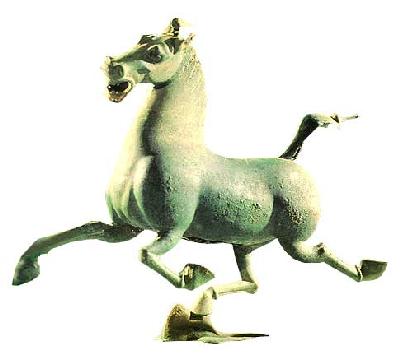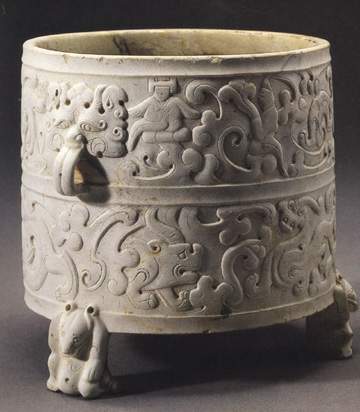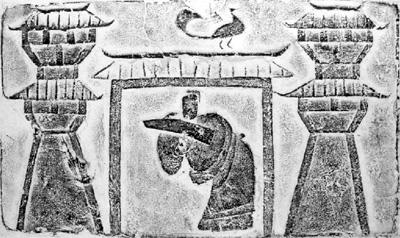 |
| Galloping Horse Treading on a Flying
Swallow |
The Eastern Han Dynasty lasted from 25 to 220.
During the reign of Wang Mang, the emperor of the Xin Dynasty, Liu Xiu and his
elder brother joined the Green Woodsmen Army. Liu later took the leadership and
united other peasant armed forces.
In 25, Liu proclaimed himself emperor of the
Han in Hao (today's Baixiang County, Hebei Province), making Luoyang City the
capital. He restored the Han Dynasty, henceforth known as the Eastern Han
Dynasty, to distinguish it from the Western Han.
The early years of Liu's reign were devoted
to unification. After cracking down on the remnant peasant forces and
eliminating rival regimes in various localities, Liu unified the country in
40.
 |
| Jade wine goblet of the Eastern Han Dynasty decorated
with patterns of legendary animals |
The dynasty
established by Liu was even more autocratic than the Western Han. To prevent
high officials, relatives of the empress and imperial clansmen from seizing
power, which was a prevalent phenomenon in the later period of the Western Han,
Liu carried out a series of measures to strengthen his regime. In 48, he
reinforced the laws adopted by the Western Han, strictly prohibiting the lords
of the fiefdoms from forming cliques. Furthermore, Liu took direct control of
the department handling imperial documents, making it an office for the emperor
to issue orders to the whole country. Thus, Liu firmly took all powers into his
hands.
 |
| Brick relief of the Eastern Han Dynasty unearthed in
Sichuan Province |
The Eastern Han period witnessed
steady economic and cultural developments and frequent foreign exchanges. During
Liu's reign, the Han court received a Japanese goodwill envoy (then called Wo),
to whom the emperor gave a seal inscribed with a title of honor. The Eastern Han
also had a good relationship with India and the Roman Empire. An ambassador of
King Antoninus of the Roman Empire once came to China bearing gifts of ivory for
the reigning Han emperor.
During the late Eastern Han, relatives of
the empress and eunuchs assumed all the power, which led to intensified social
conflicts and sustained insurgent activities that culminated in the Yellow
Turban Uprising in 184. In 196, Cao Cao, one of the most powerful warlords, took
Emperor Xiandi under his control and used the name of the puppet emperor to
endorse his actions. The Eastern Han Dynasty endured only nominally, and soon
gave way to the Three Kingdoms. In 220, Cao Pi, Cao Cao's son, deposed Emperor
Xiandi and proclaimed himself Emperor of the Wei.



